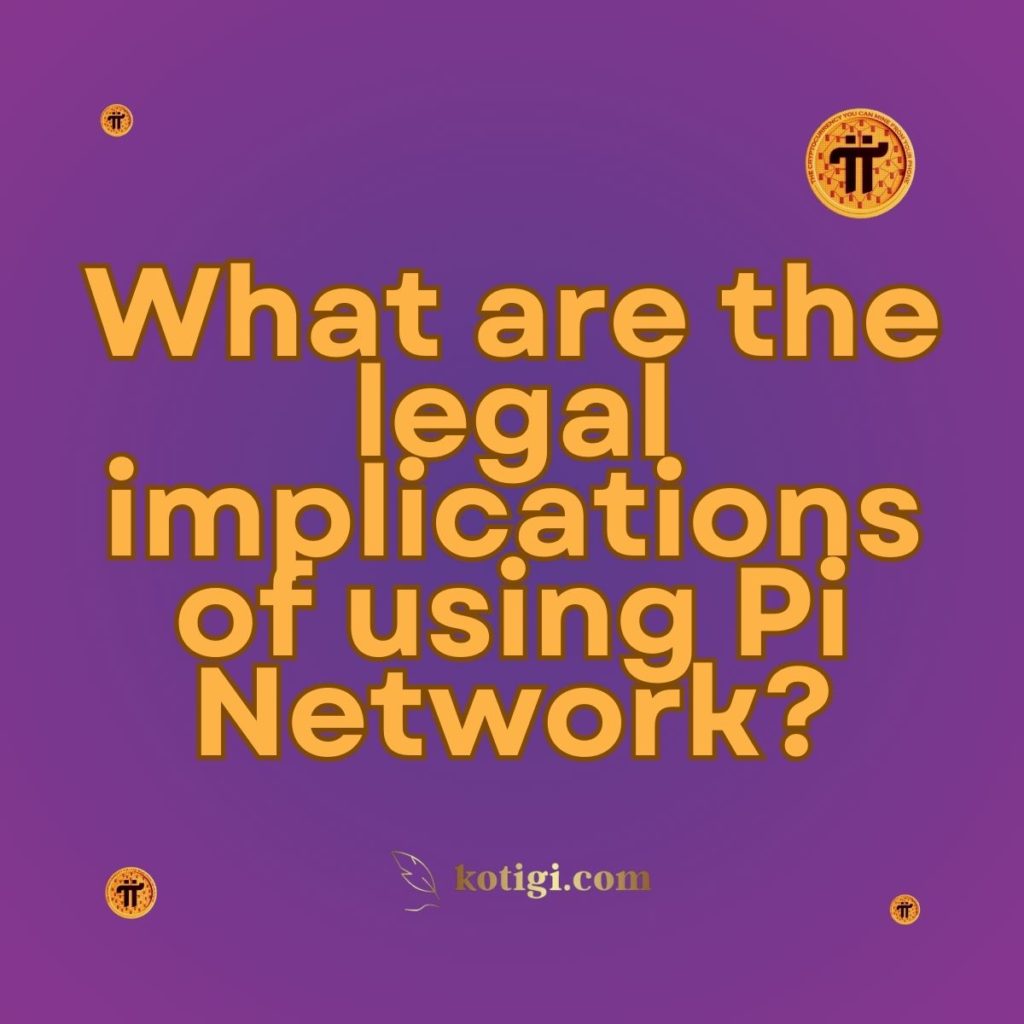
What are the legal implications of using Pi Network?
Using Pi Network is generally legal in most jurisdictions, but users must be mindful of local cryptocurrency regulations, taxation laws, and data protection rules. While Pi Network complies with many global standards like KYC and AML, its legal status can vary depending on the country’s stance on digital assets.
Introduction
The rise of Pi Network has sparked curiosity and optimism among crypto enthusiasts worldwide. As an accessible, mobile-first cryptocurrency platform, Pi Network promises financial inclusion through simple digital mining. However, with every technological innovation comes the need to understand its legal implications. This article explores the legal dimensions of using Pi Network, including regulatory compliance, taxation, data privacy, and cross-border risks.
Understanding Pi Network’s Operational Framework
Decentralized Mining Model
Pi Network introduces a novel way of mining cryptocurrency through a smartphone app, significantly reducing the energy costs and barriers to entry typically associated with blockchain mining. This model empowers users around the globe, especially those in developing countries, to participate in the crypto economy without expensive equipment. However, such accessibility may attract scrutiny from regulators concerned about unregulated digital currency circulation.
Community Validation and KYC
To prevent fraud and ensure system integrity, Pi Network employs a community validation system combined with a strict KYC process. Every user must verify their identity, which not only supports anti-fraud efforts but also aligns Pi Network with global AML and CFT (Combating the Financing of Terrorism) protocols. This compliance is critical to ensuring the project’s legitimacy and facilitating future integration with financial institutions and governments.
Transition to Mainnet and Exchange Listings
Since Pi Network’s listing on major exchanges such as OKX, Bitget, and Gate.io in February 2025, it has transitioned from a testnet environment to a functioning mainnet. This shift brings about new legal responsibilities, including compliance with securities regulations, exchange policies, and jurisdictional laws in the countries where these platforms operate.
Regulatory Considerations by Jurisdiction
Varying Legal Stances on Crypto
Cryptocurrency remains a legal gray area in many regions. In the United States, the Securities and Exchange Commission (SEC) and the Commodity Futures Trading Commission (CFTC) provide guidance, but classification issues persist—are Pi coins commodities, securities, or digital assets? In the EU, the MiCA (Markets in Crypto-Assets) regulation offers a more unified framework. Elsewhere, some countries like India fluctuate between regulation and restriction, while others like Nigeria and Venezuela have created digital currency alternatives. Therefore, Pi users must stay informed about how local authorities define and treat cryptocurrencies.
BitLicense in New York
New York’s BitLicense is one of the strictest crypto regulatory frameworks in the world. To operate legally in this jurisdiction, crypto platforms must obtain a license that includes strict capital requirements, AML protocols, and consumer protection measures. If Pi Network or associated exchanges allow users in New York, compliance with BitLicense is necessary to avoid fines or operational bans.
Bans and Restrictions
In some nations, cryptocurrency activities are outright banned. China, Algeria, Bangladesh, and Bolivia are examples where crypto trading and mining are illegal. If users access Pi Network in these countries through VPNs or underground channels, they risk severe legal penalties, including fines, confiscation of assets, or imprisonment. It’s crucial for users in such areas to be aware of the legal risks associated with non-compliance.
Tax Implications of Using Pi Network
Taxable Events
Governments increasingly treat cryptocurrency earnings as taxable events. This includes receiving Pi coins through mining, transferring them to exchanges, or using them to buy goods and services. Even staking Pi for rewards can create tax liabilities depending on jurisdiction.
Capital Gains and Income Taxes
In most countries, crypto earnings are categorized as either capital gains or ordinary income. If a user mines Pi, it may be considered earned income, while selling it later at a higher price may trigger capital gains tax. Countries like the U.S., Canada, and the UK require detailed recordkeeping to differentiate between these tax types.
Reporting Obligations
Tax authorities in jurisdictions such as the U.S. (via the IRS Form 8949) and Australia (via the ATO) require annual reporting of crypto transactions. Non-compliance may lead to audits, fines, and legal repercussions. Pi Network users should consider consulting a tax professional to ensure compliance.
Automated Tax Tools
Several platforms, such as CoinTracker and Koinly, support Pi coin integrations for tax reporting. These tools automatically track transactions and generate reports, simplifying compliance.
Data Privacy and Security Laws
GDPR Compliance in the EU
The General Data Protection Regulation (GDPR) is a comprehensive data protection law in the European Union that affects any company handling EU residents’ data. Pi Network must clearly explain what user data is collected during KYC, how it is stored, and who it is shared with. Non-compliance can result in fines of up to 4% of global annual turnover.
Data Handling Transparency
Pi Network collects sensitive personal information, such as ID documents and biometric data, during KYC. Legal frameworks in multiple countries require transparency in how such data is processed and stored. Users should review Pi’s privacy policy to understand their rights.
Third-Party Data Sharing
It’s crucial to examine whether Pi Network shares personal data with third-party vendors, government agencies, or advertisers. Transparency here is vital to build user trust and comply with data protection laws like CCPA (California Consumer Privacy Act) in the U.S. or LGPD in Brazil.
Consumer Protection and Liability
Terms of Service
The Pi Network app outlines its liabilities, obligations, and limitations in its Terms of Service. These documents are legally binding and dictate how disputes will be handled. Users agree to arbitration clauses, jurisdiction clauses, and disclaimers by simply using the app.
Platform Downtime or Losses
Cryptocurrency platforms are not immune to bugs, hacking, or server downtime. While Pi Network likely has safeguards, it may not reimburse lost funds unless explicitly stated. Therefore, users should understand the legal limitations of any recourse.
Fraud and Misrepresentation
Given the growing number of scams impersonating Pi Network or promising faster KYC approval, legal protections may be limited if users interact with unverified platforms. Always use official links and apps to avoid falling prey to fraud.
Cross-Border Legal Challenges
International Use and Regulations
Pi Network is a global platform, but laws are local. Users operating across borders must be aware of double taxation treaties, foreign asset disclosures, and reporting obligations. For example, Americans must report foreign-held crypto accounts exceeding $10,000 under FBAR rules.
Exchange Limitations
While major exchanges now support Pi, they may restrict users from certain countries due to regulatory constraints. Always verify whether your country is on an exchange’s banned list before attempting to trade Pi.
Legal Jurisdiction in Disputes
Legal conflicts involving Pi Network or related exchanges may fall under the jurisdiction of the country where the entity is registered. For instance, if Gate.io is based in Singapore, legal disputes would be governed by Singaporean law, complicating redress for foreign users.
Compliance with Anti-Money Laundering (AML) Laws
AML Verification Procedures
To comply with global AML standards, Pi Network performs verification through government-issued ID, facial recognition, and email authentication. This reduces the risk of illicit financial activity on the platform.
Suspicious Transaction Monitoring
Some exchanges require transaction monitoring tools to detect suspicious activities. If you move large volumes of Pi coins without justification, your account could be flagged or frozen, and authorities may be notified.
Regulatory Cooperation
To ensure future sustainability, Pi Network may need to partner with regulatory agencies to comply with international frameworks such as FATF (Financial Action Task Force) recommendations. This includes appointing a compliance officer and maintaining internal audit trails.
Future Legal Outlook for Pi Network
Pending Regulations
Global crypto regulations are evolving rapidly. The U.S. Congress, European Commission, and G20 nations are working on unified regulatory approaches. Pi Network must adapt to these changes to remain compliant.
Legal Risks of DeFi Integration
As Pi Network explores decentralized finance (DeFi) and smart contracts, new legal challenges arise, such as whether automated transactions are enforceable contracts or whether staking platforms must register as investment vehicles.
Institutional Acceptance
Legal clarity and compliance are essential for broader institutional acceptance. Financial institutions, payment processors, and app developers will only integrate Pi Network once its legal status is crystal clear in major economies.
Conclusion
While using Pi Network is legal in most parts of the world, the platform’s users must navigate a complex legal landscape involving data privacy, taxation, and regulatory compliance. From KYC to exchange withdrawals, each action may carry legal implications depending on your country of residence. Staying informed and seeking legal advice when needed is crucial for anyone participating in the Pi ecosystem.
Pi Network’s long-term success will depend on its ability to proactively comply with global laws while empowering users with secure, transparent tools. Whether you’re a miner, developer, or investor, understanding the legal implications of your actions is key to mitigating risk and maximizing opportunity.
Key Takeaways
- Pi Network complies with global standards like KYC and AML, but legal status depends on local laws.
- Trading Pi coins may be subject to taxes; users should report transactions accurately.
- Data privacy laws such as GDPR and CCPA apply to Pi Network users in relevant jurisdictions.
- Legal liability is limited by Pi Network’s Terms of Service; always read the fine print.
- Cross-border use introduces additional regulatory complexity; verify local rules before participating.
- AML, tax, and consumer protection laws may evolve—users must stay informed to remain compliant.
- Legal clarity will be essential for Pi’s long-term adoption by institutions and global users.




